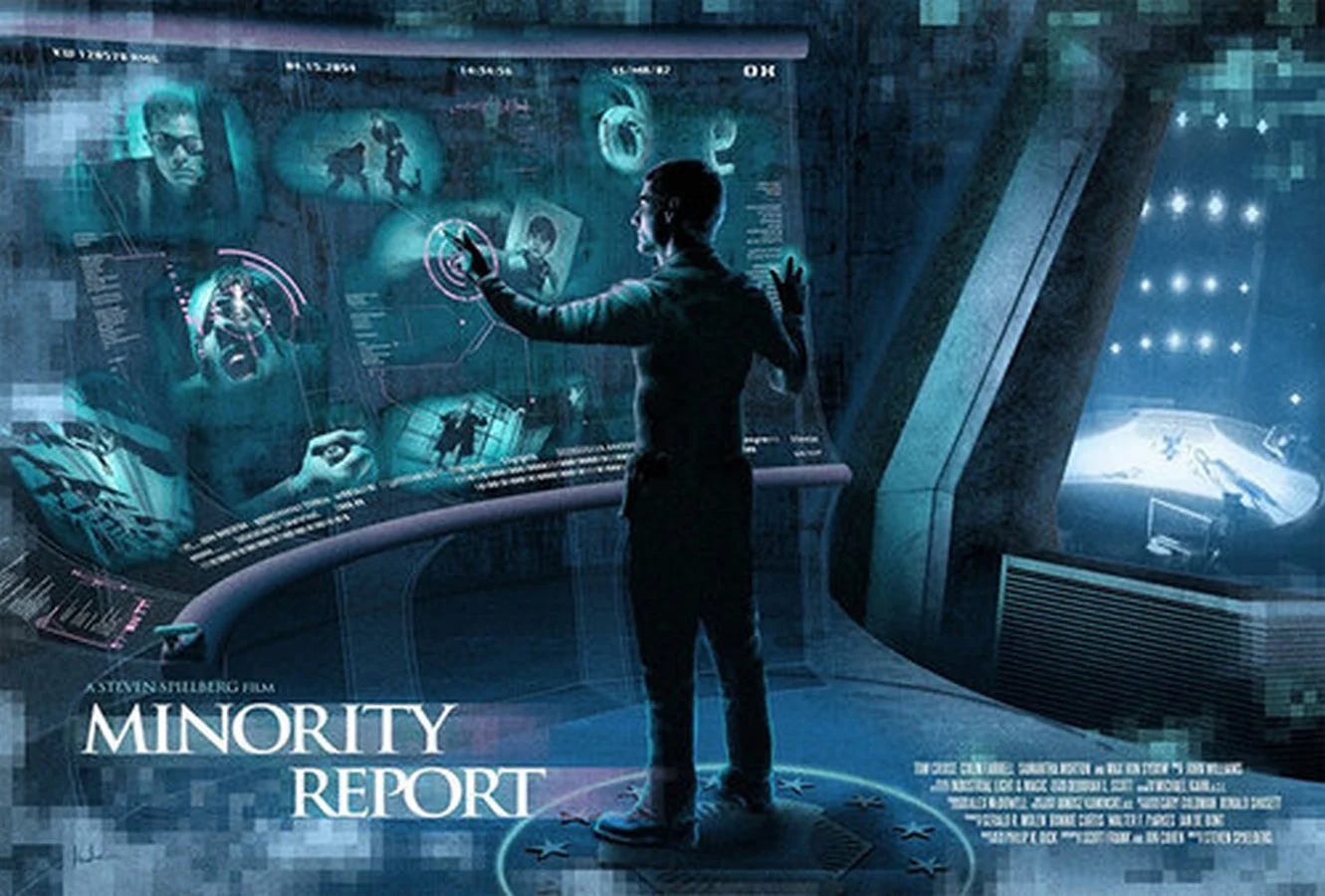This is a reader-supported publication. I give it all away for free but could really use your support if you want me to keep doing this.
The dark AI scenario hangs out there: the Global North, having perfected its use as a form of top-down social and political and economic control, extends those technological empires across the Global South — in effect, trapping those masses there amidst a decaying environment and the general devastation imposed by climate change.
In this scenario, the dystopian aspects of the film series Blade Runner are purposefully ghettoed across the Global South — the left behind portion of the planet and humanity singled out to suffer the worst impacts of climate change and over-population while the walled-off Global North becomes the equivalent of “Off World Colonies” that these lesser humans can never hope to visit — much less live in.
Thus, the feared “forking” of humans versus AI never really occurs, as the advanced North goes on to “perfect” humans with biotech advances and “perfect” society with AI-fueled enhancements that deliver security and certainty at the price of autonomy and privacy, while the un-risen South becomes the scary Mad Max-y wasteland to which the North’s “incorrigibles” are dumped as punishment for not fitting in with this hyper-directed existence in which it’s unclear whether humans are truly in control anymore.
That forking between the perfected urban landscape and the devastated lands beyond the wall is a staple of science fiction: the scary “discovery” in the tale being that the urban (here, Northern) good life can only be sustained by the most cruel exploitation of those trapped in the hinterlands (here, Global South). You know the drill: “Soylent Green is people!” “They’re killing everyone when they turn 30!” and the like. The drama comes in the revealing of the BIG LIE rationalizing the Great Divide between the “deserving” who thrive while the “undeserving” barely survive. Invariably, the distinction is cast along some religious lines — we are the saved and they are the lost.
The logic seems unassailable in its brutal zero-sum-ness: the North can only become paradise if the South is reduced to a living hell. And, when that breakdown itself breaks down (i.e., the North can’t any longer survive by pillaging what’s left of the South), then it truly is a matter of needing to build, and escape to, those “off-world colonies” of which Musk so ardently dreams.
In this pathway, then, the North embraces AI and robots and automation and the pervasively sensoring/censoring of social environments to become a sort of fused existence in which I, the individual, can’t really tell where I end and the AI begins — it’s that seamless and co-evolved and pre-crime-like in its sense of safety (see, Minority Report).
Across the Global South, however, all the same technologies used to “perfect” the North are employed to discipline the masses in the most preemptive manner possible — very Robocop or Judge Dredd-like in that it sees, it judges, and it dispatches on the spot. Here we’re talking the “drone hellscape” that we’re just getting a glimpse of today in Ukraine and Gaza.
Indeed, Gaza is becoming the rather perfect avatar of this divided future: Israel can only remain Israel if Gaza is reduced to a wasteland ruled over by killer drones operated by AI that plays judge, jury, and executioner as required — on the spot. Why? Because this is the price Israel must pay for its advancing/perfecting existence.
Also notice how Israel is enforcing this logic — normalizing it globally — by instantly labeling, typically through proxy organizations, anyone who disputes the inevitable outcome or calls into question the ethics justifying it as “Hamas Support Organizations.” And guess what? In America already, that behavior alone can get you sent off to whichever Gulag Mar-a-Lago location today’s deportation flight is headed.
Just blow that up to the global scale and you get what I’m talking about — the zero-sum-ness in which every life enhanced and extended requires another to be diminished and constricted. To fight that logic is to automatically be labeled a “terrorist” — the equivalent of Blade Runner’s rogue “skin jobs” who need to be dispatched with extreme prejudice at the earliest possible moment.
I can feel this future gnawing at the edges of today’s darkening reality.
Notice how every crime now is sort of terrorism and can inevitably be traced back to some evil migrant. Those people can and should be snatched off the street at random and then sent — with great purpose — to the worst possible hell-hole America can con/bully into accepting them.
Check out where the US is dumping these “vermin”: South Sudan, Libya, and El Salvador right now, with talks unfolding to expand the list to Benin, Angola, Rwanda, and Estwatini — all places with sketchy human rights records but, then again, isn’t that the point?
Libya is the perfect example of this divided future, as is the story about the EU paying North African governments to take significant numbers of migrants deep into the Saharan Desert and dumping them there.
WAPO: Silicon Valley Is at an Inflection Point
The Washington Post argues that our own Silicon Valley is at an “inflection point” when it comes to partnering with the US Government to start building these cyber empires both at home and abroad — lest we lose out to China.
The leading A.I. giants are no longer merely multinational corporations; they are growing into modern-day empires. With the full support of the federal government, soon they will be able to reshape most spheres of society as they please, from the political to the economic to the production of science.
On many levels — and you have heard this from me many times — such partnering is inevitable and good because it symmetrizes our national effort with China’s and, absent that, China wins by sheer default.
Companies claim they will bring humanity into a new, enlightened age — that they alone have the scientific and moral clarity to control a technology that, in their telling, will usher us to hell if China develops it first. “A.I. companies in the U.S. and other democracies must have better models than those in China if we want to prevail,” said Dario Amodei, chief executive of Anthropic, an A.I. start-up.
But, of course, the question to be asked here is whether or not our version of digital integration will end up being morally superior to that of China’s. We can assume that it must be, given the differing sources, but, if we pursue this future in strictly fear-threat terms, then America’s AI victories are likely to be indistinguishable from China’s.
We are now closer than ever to a world in which tech companies can seize land, operate their own currencies, reorder the economy and remake our politics with little consequence. That comes at a cost — when companies rule supreme, people lose their ability to assert their voice in the political process and democracy cannot hold.
Indeed, we are likely to create a world divided into the AI-enhanced versus the AI-enforced.
YAHOO FINANCE: Venture funding is creating a global AI divide, even as sovereign wealth funds and tech unicorns try to bridge the gap
The emerging global dynamic, simply stated:
Everyone wants AI, but they don’t know if they have the capital to build it on their own terms. In the U.S., we’re accustomed to hearing about some new multi-billion-dollar startup funding deal seemingly every week, but this is not a reality for most of the world’s countries, let alone regions. And that’s not to mention the immense energy demands needed to supply the computing power for the AI revolution …
It’s a concept that’s hotly debated alongside the rapid rise of AI—the question of sovereignty, or how a country can control and guide the technology’s development, especially when it’s being created by non-state companies, often in a different language and cultural context.
I won’t pretend I can both frame the danger and solve it in a single Substack. Like most people, I’m just trying to wrap my head around these disparate scenarios being cited and inferred, looking for signposts of our heading out along one direction versus another.
But I do want to start collecting solutions — at least in my head.
This is one that caught my eye:
REST OF WORLD: In a world first, Brazilians will soon be able to sell their digital data; Brazil is piloting dWallet, a project that lets citizens earn money from their data. It is ahead of similar U.S.-based initiatives.
The idea is straightforward enough:
Last month, Brazil announced it is rolling out a data ownership pilot that will allow its citizens to manage, own, and profit from their digital footprint — the first such nationwide initiative in the world.
The project is administered by Dataprev, a state-owned company that provides technological solutions for the government’s social programs. Dataprev is partnering with DrumWave, a California-based data valuation and monetization firm.
Today, “people get nothing from the data they share,” Brittany Kaiser, co-founder of the Own Your Data Foundation and board adviser for DrumWave, told Rest of World. “Brazil has decided its citizens should have ownership rights over their data.”
In monetizing users’ data, Brazil is ahead of the U.S., where a 2019 “data dividend” initiative by California Governor Gavin Newsom never took off. The city of Chicago successfully monetizes government data including transportation and education. If implemented, Brazil’s will be the first public-private partnership that allows citizens, rather than companies, to get a share of the global data market, currently valued at $4 billion and expected to grow to over $40 billion by 2034.
I like this idea a lot, and am unsurprised it is advancing faster in Brazil than in the US because, by geographic location, Brazil sits on the wrong side of the tracks, so to speak, when it comes to which regions are empowered by climate change and which are devastated. Facing a much tougher future than the US, Brazil needs to pioneer such concepts and practices to prevent that great North-v-South “wall” from going up.
And yes, that wall can be literal and it can be virtual, and Brazil is smart to start proposing a different path ahead.
As a rule, I don’t like to just lay out scary scenarios. As such, I was saving this post for pairing with something like this REST OF WORLD story.
“Rest of world” as the source pub. You gotta like that!














